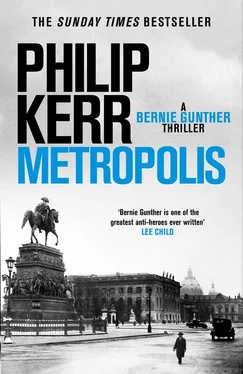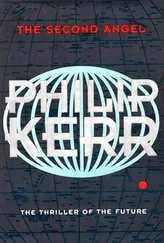‘If this gets out,’ said Gennat, ‘the new government will be over before it’s even started. The last thing we need now unless you’re a goddamn Nazi is another election. There’s only so much democracy that one country can take before it starts to get tired of the idea.’
‘Then we’d best keep this to ourselves,’ said Weiss.
‘Agreed,’ said Gennat.
I nodded my assent as if that were important; the idea that I might have some influence over the fate of the government seemed absurd to me.
‘I’ll speak to Grzesinski and suggest that he and his American friend might like to behave a little more discreetly in future,’ added Weiss. ‘For his sake and the country’s. Anyway, this is all beside the point. You obtained another description of the murderer, Gunther. Which fits the one we already had from the woman who found Fritz Pabst. Good work, my boy. First thing in the morning I want you to visit the Reichsbank on Jägerstrasse and get them to start checking up on that ten-mark banknote you found. If you have any problems with this, telephone me at home and I’ll speak to Heinrich Köhler himself. He owes me a favour.’
Köhler was the German finance minister.
‘But right now, you should go home. You, too, Ernst. We’ve done all we can tonight, short of staging a candlelit vigil for the dead girl.’ He glanced up as someone in one of the higher windows whistled down to us. ‘If we stay out here any longer they’ll be wanting a few bars of “Berliner Luft”.’
‘According to the serial number, the banknote I found in Eva Angerstein’s handbag was issued just a week ago,’ I said. ‘I’ve traced it to a branch of Commerzbank, in Moabit. The manager believes it was part of a batch of notes from the German central bank that was divided up and paid out to one or two local businesses in time to be distributed in workers’ wage packets last Friday. By far the largest of these payments was made to the Charité hospital, which means the killer could be a medical man. And that would certainly be consistent with the killer’s fondness for — and skill with — a sharp knife. It’s my belief that we should probably speak to the hospital director and arrange to have all male employees of the Charité interviewed by police officers from the Alex as soon as possible. We have a description of the man, we even have a possible handprint, and we can certainly check alibis. This note might be just enough to narrow down our inquiry quite significantly.’
Weiss listened carefully and then nodded. It was Monday afternoon and we were in his office at the Alex. I sensed I only had half his attention, which was perhaps hardly surprising. It had been a difficult weekend for the Berlin police and for him in particular — the large bruise on his face told me that much. At the communist march in West Berlin, the police had charged after the Reds had broken through their lines, shots had been fired and a communist workman had been killed. And if all that wasn’t enough, Weiss had been assaulted on Frankfurter Allee by Otto Dillenburger while he himself was watching a different communist demonstration. An openly right-wing police colonel in command of the eastern police region, Dillenburger had previously alleged that Weiss was secretly colluding with the communists, and he was now suspended from duty pending an inquiry by the Praesidium. But already he’d lodged an appeal with the PPPO — the Prussian Police Officers’ Association — and it was widely held that the colonel would be quickly reinstated. The PPPO was almost as right wing as Dillenburger himself.
You didn’t have to be a detective to work out why Weiss was suspected of being a communist; not in Germany. Everyone who was sympathetic to the Nazis believed that a Jew was just a communist with a big nose and a gold watch. I felt desperately sorry for this man whom I and many others much admired, but I didn’t mention the incident with Dillenburger; Weiss wasn’t the type to dwell on his own misfortunes or to seek sympathy.
‘Approximately how many people would you say work at the Charité hospital, Bernie?’
‘I don’t know. Perhaps a thousand.’
‘And how many men do you think work here, at the Alex?’
‘About half that number.’
Weiss smiled. ‘True. I fear there are many reforms still needed to make this the force it might yet become. A great many policemen are just hanging on for a severance payment or a police maintenance claim with which to start up a business. Between you and me, I’ve heard of some patrolmen leaving the force with several thousand marks in their pockets.’
I whistled quietly. ‘So that’s why the uniformed boys wear those riding breeches. You need big pockets with that kind of money on offer.’
‘Ironic, isn’t it?’ said Weiss. ‘For all its antipathy to socialism and to trade unionism and workers’ rights, I know of no organization in the whole of Germany with more powerful unions than the Berlin police.’
He relit his cigar and stared up at the three-arm brass gasolier, as if things were clearer near the ceiling.
‘Bernie, what you recommend is certainly what should be done, without question; and I’ve no doubt that in the future, all investigations will be conducted on the basis of cross-referenced witness statements. But I’m afraid that what you’re suggesting is quite impossible. For one thing, we don’t have the time, but even if we did, I’m not sure I should follow your recommendation. You see, there’s the politics of it to consider. Yes, the politics, although I hate mentioning a word like that in this building. Let me explain. I’m not one of those who believe that Berlin society is improved by the presence of fewer girls on the street, but there are many — Commissar Körner, for example — who believe exactly that. And the plain fact of the matter is that if we’re going to catch this psychopath it will have to be with the immediate resources of the Murder Commission and a few like-minded Kripo officers, rather than the whole police department. So as far as the Charité is concerned, feel free to speak to the hospital director; maybe he can identify a few doctors who present themselves as morally insane. I’ve certainly met a few of those in my time. But I fear that if you do conduct any more interviews, it will have to be a mostly solo effort. I’m sorry, Bernie, but that’s just how it is and how it has to be. Understand?’
‘I understand.’
‘Was there anything else?’
‘Yes. There’s a writer who’d like a little help with a script she’s writing about a police detective investigating a series of murders. Background research, I suppose. I’d like your permission to bring her into the Commission’s offices on one of my days off this week. Her name is Thea von Harbou.’
‘Married to Fritz Lang, the film director. Yes, I’ve heard of her. Permission granted. With one proviso.’
‘And that is?’
‘Thea von Harbou comes from a family of minor Bavarian nobility. The same cannot be said of Fritz Lang. Lang is a Jew who identifies as a Roman Catholic but that means nothing to the likes of Hitler and his local ape, Josef Goebbels. Once a Jew always a Jew. So bring her here to the Alex by all means, and give her all the assistance you think appropriate, but please make sure you deal with her and with her husband discreetly, as if your name was Albert Grzesinski and hers was Daisy Torrens.’
It was like visiting Berlin Zoo but without the entry charge, which probably was why there was a longer line to be admitted to the place. Berlin’s showhouse for the dead — otherwise known as the police morgue — was just that: a popular spectacle and perhaps the last place in Europe where the murdered corpses of your fellow citizens could be viewed in all their anonymous ruination, no matter how horrific that might be. People queued along Hannoversche Strasse as far as Oranienburger Tor to get in to see the ‘exhibits’. Grouped in glass cases around the central hall, they most resembled the inhabitants of the zoo’s famous aquarium. Certainly many of these corpses looked as torpid as any ancient moray eel or crusty blue lobster. Children under sixteen were forbidden entry but it certainly didn’t stop them from trying to sneak past attendants who were employed not by the police, nor by the Charité hospital across the street, but by the city’s animal hospital next door. As a schoolboy, I myself had tried to get into the Hanno showhouse; and once, to my everlasting disgust, I had succeeded.
Читать дальше












